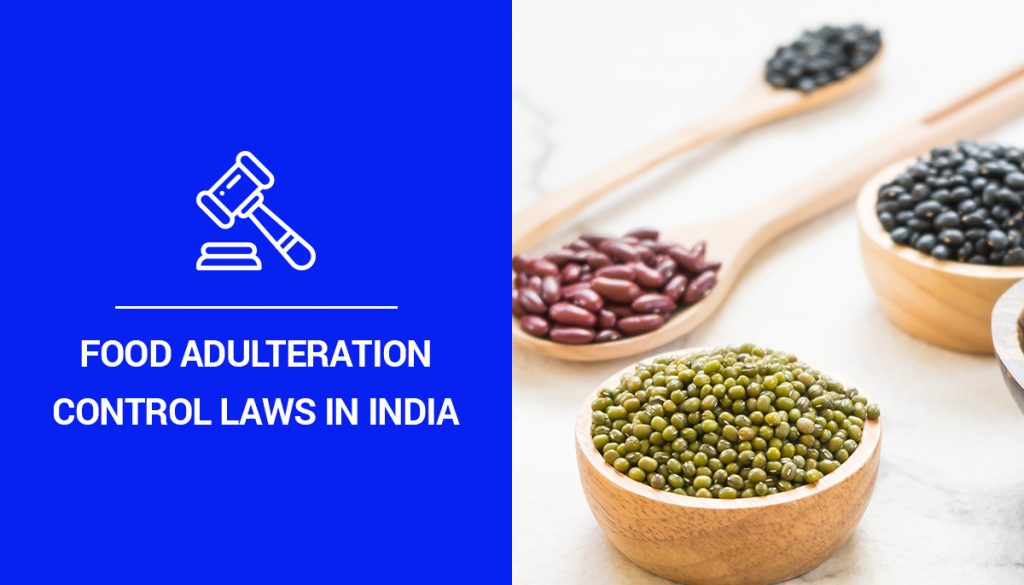Guidelines under Food Adulteration Control Laws in India

Swarit Advisors | Updated: Apr 05, 2019 | Category: FSSAI
The role of food Industry in India mainly includes manufacturing, packaging, processing, wholesale as well as the distribution of the complete food products. Food Industry does not compromise on the quality of products offered to the people. But, in spite of many instructions, food seller or processor are still selling adulterated food to the consumers and earning a huge income. Therefore, considering this alarming situation and consumer’s health, the government has come up with several Food Adulteration Control Laws in India. Before we discuss the associated laws, let us understand the true meaning of Food Adulteration.
Table of Contents
What is Food Adulteration?
Food Adulteration is the process of adding inferior quality elements in foods and removing the vital elements from the food products. Basically, the addition of adulterants to the food items and removal of vital minerals and nutrients from the food products lead to reduced food quality. As a result, consumers suffer a lot and have a direct impact on their health.
Typically, there is a certain benchmark that defines the standard and quality of food. Food adulteration Control laws have set a parameter to avoid the addition of substances in the food composition that would commonly affect public health. Added chemicals could mainly cause reduced food quality.
Food Processing Industry is one of the largest business sectors in the country. Hence, it is widely recognized as the ‘sunrise industry.’ Furthermore, the industry has the complete potential option to the uplift economy in agriculture or for creating the large scale of the processed food.
What are the Important Laws Governing Indian Food Industry?
There are several laws that regulate the Indian Food Processing Industry and govern complete aspects of the licensing, sanitation as well as other necessary permits for starting or running the food business. The legislation deals with the complete aspects of the food safety features based on the Prevention of Food Adulteration Act, 1954 or “PFA” in India. PFA is in place for more than 5 decades and has become the most important aspects for varied reasons that include any changes in the food industry.
PFA act came into existence based on the new set of Food Safety and Standards Act, 2006 or “FSSA” which overrides the complete food-related laws to the extent. This includes 8 Laws that consists of operation and enforcement of the FSSA as follows:
- The Vegetable Oil Products (Control) Order, 1947
- The Prevention of Food Adulteration Act, 1954
- Essential Commodities Act, 1955 (in relation to food)
- The Fruit Products Order, 1955
- The Solvent Extracted Oil, Deoiled Meal, and Edible Flour (Control) Order, 1967
- The Meat Food Products Order, 1973
- The Milk and Milk Products Order, 1992
- The Edible Oils Packaging (Regulation) Order, 1998
What are the Statistics Analyses of the Food Adulteration?
The Food adulteration has always experienced inflation and we can say this on the basis of numerous statistics which are as follows:
- Based on the records of health and family welfare ministry, 20% of food is substandard or adulterated in the financial year 2012-13.
- In the year 2008-09 to 2012-13, the amount of adulterated food has widely increased by 8% to 20%.
- About 32% of packaged food products have been genetically modified.
- 70% of milk and other contents consists of water as a common adulterant. In addition, adulterers also use detergents as adulterants which impose major health hazard to a great extent.
The Process of Food Analysis
For checking the complete food adulteration, it is important to keep the law sustained and keep adulterers within the check.
Analysis of food Act comes with complete responsibility for the Food Authority. Furthermore, all the food laboratories, as well as other research institution, holding the accreditation will receive the notification regarding the food analysis. Only the National Accreditation Board for Testing and Calibration Laboratories as well as much other Accreditation agencies would make the complete analysis of the complete food samples.
Analysis of the food would be under specific Rules and Regulations by the represented Food Analysts by the Commissioner of Food Safety.
What are the Offences and Penalties of the Laws?
Food Adulteration is the debasing quality of food for the sale with the substitution of the inferior substances or removing the valuable ingredient. Based on the act, there are certain penalties for them that every Food Business Operator will have to bear in the case of guilty of food adulteration. Those penalties are as follows:
- Selling of food not in exact quality range as per the regulations under the Act – Penalty exceeds 5 lakh rupees
- Manufacturing, selling, distributing, importing or selling food of sub-standard quality – Penalty exceeds 5 lakh rupees
- Manufacturing for selling, distributing, sale storing or importing misbranded of the food products – Penalty up to 3 lakh rupees
- The Act Prohibits having deceptive or misleading advertisements with enabled with the penalty to some extent – Penalty up to 10 lakh rupees
- Manufacturing, selling, storing, distributing or importing the food product that contains any kind of extraneous material – Penalty 1 lakh rupees
- The act imposed with the penalty on the food business importer or operator fails to comply on provisions of the Act – Penalty extend to 2 lakh rupees
- Manufacturing or processing the food in the unhealthy or unhygienic conditions – Penalty extend up to 1 lakh rupees
- Penalty to Possession of the Adulterant
- When No separate penalty is provided and there is any contravention for provisions or for regulations of the Act – Penalty extend up to 2 lakh rupees
What Is The Need For A New Act?
Recently, the FSSA has started the harmonization based on India’s food regulations based on the International Standards to the extent.
- It is mainly established with complete new National Regulatory body and enabled with the Food Safety and Standards Authority of India or “FSSAI”.
- It would regulate the complete aspects of the manufacturing, processing, distribution, storage, import as well as the sale of the food that ensures to give you the better aspects. Food imported would be subject to the provision of every rules and regulation in the FSSA.
What are the key regulations and guidelines under FSSAI?
The Food Safety and Standards Act, 2006 and FSSAI (Food Safety and Standard Authority of India) have certain key regulations and guidelines:
Packaging and Labelling
Regulations based on Packaging and Labelling are called the Food Safety and Standards (Packaging and Labelling) Regulations, 2011. It mainly has the statutory and regulatory requirements to enable complete Packaging and Labelling Regulations.
- Regulation 2.12 in Food Safety and Standards included with Regulations, 2011 mainly defined with “proprietary food” are the common aspects that are not standardized with regulation.
- Regulation 1 (8) in Packaging and Labelling Regulations mainly states that “pre-packaged” or “pre-packed food” are placed under the package in nature. Packaging and Labelling Regulations mainly enabled with general requirements as particulars of declaration for specified regulation.
Research and Quality Assurance
To ensure the quality of food, the FSSAI has issued specific guidelines for food safety research and has made it mandatory to perform several functions associated with standard and quality of food. The Research and Development division is accountable for researching the following goals:
- Creating new knowledge to continuously update and upgrade food safety standards which are compatible with International organizations.
- In order to improve or build policies related to quality food, the R&D division is supposed to carry out evidence-based studies.
Conclusion
Since the process of food adulteration degrades the quality of food items and harms public health, it is an offence under the Food Adulteration Control Laws. Any person or company found guilty of the same would be subject to hefty penalty and could even be behind the bars. Therefore, if you are into any kind of food business, make sure you abide by the above-described food laws.
In the case, if you are opening a food business, you will require several licenses to operate the business successfully. Contact the team of Swarit Advisors. We will help you to set up your business and get you all the license and permits required for starting the business.













